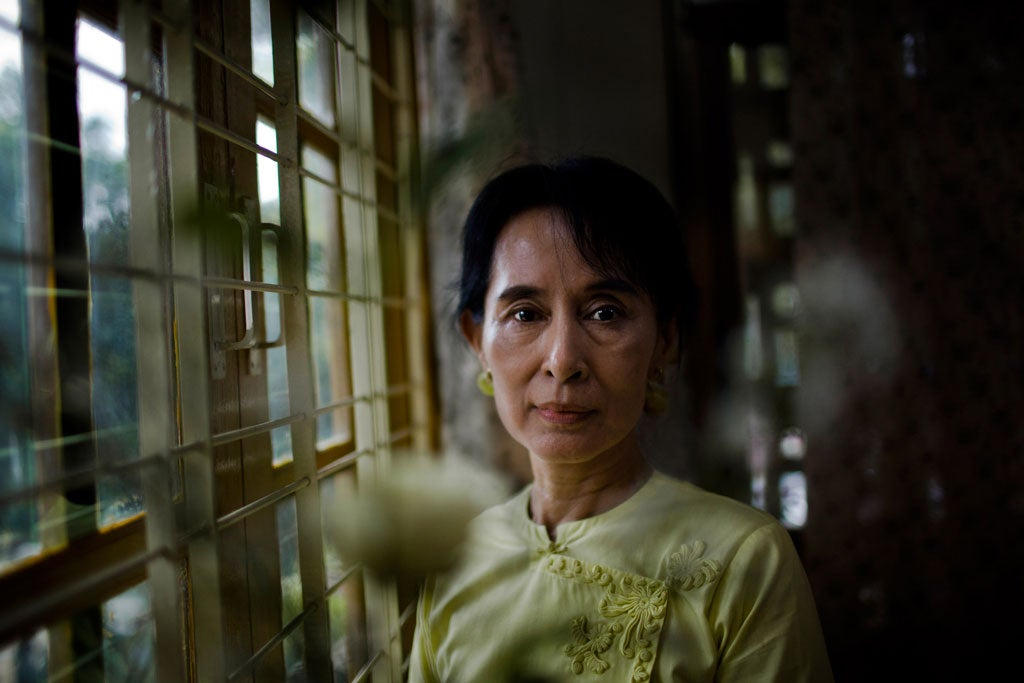The Lady and the Peacock: The Life of Aung San Suu Kyi, By Peter Popham

Your support helps us to tell the story
From reproductive rights to climate change to Big Tech, The Independent is on the ground when the story is developing. Whether it's investigating the financials of Elon Musk's pro-Trump PAC or producing our latest documentary, 'The A Word', which shines a light on the American women fighting for reproductive rights, we know how important it is to parse out the facts from the messaging.
At such a critical moment in US history, we need reporters on the ground. Your donation allows us to keep sending journalists to speak to both sides of the story.
The Independent is trusted by Americans across the entire political spectrum. And unlike many other quality news outlets, we choose not to lock Americans out of our reporting and analysis with paywalls. We believe quality journalism should be available to everyone, paid for by those who can afford it.
Your support makes all the difference.In Freedom from Fear, first published in 1990, Aung San Suu Kyi wrote: "It is not power that corrupts but fear... in any society where fear is rife, corruption in all forms becomes deeply entrenched." Sadly, Burma's military junta retains its grip on power through fraudulent means and intimidation.
Get money off this book at the Independent bookshop
In his accessible and impeccably researched biography of the Nobel Peace Prize laureate, Peter Popham gives a clear-sighted appraisal of how the regime's brutal methods have produced this crippling state of fear. Key events include the 1988 violent crackdown on student-led protests and the equally bloody suppression of the monks' 2007 "Saffron Revolution".
Suu Kyi's party, the National League for Democracy, won a landslide victory in the 1990 election but the military refused to recognise their right to rule, and responded by imprisoning party members and supporters. Suu Kyi was herself under house arrest at the time. During this unimaginably painful period of isolation, she fell back on her Buddhist faith and meditation. But there were also physical consequences – she had to sell her furniture to pay for food, becoming so weak from malnutrition that her hair started to fall out, and she developed spondylosis.
Her father, Aung San, the independence hero of Burma, was assassinated in 1947 when she was two years old. Suu Kyi has remained steadfastly loyal to his memory. Before she married the Oxford academic Michael Aris, Suu Kyi sent him a letter in which she famously wrote: "I only ask one thing, that should my people need me, you would help me to do my duty by them."
Popham tackles early on the controversy surrounding Suu Kyi's decision to sacrifice her husband and family for her political commitment to a nation. "Suu was acutely aware of the suffering of her people long before she returned to live there: of the poverty forced on the inhabitants of this naturally rich land by the idiocy of its rulers, on the stunting of bodies and minds by criminal economic and social policies."
He suggests that her decision to remain in Burma and forfeit a comfortable life with her husband and children was moral, rather than political. Choosing to stay earned Suu Kyi "an unwavering place in the hearts of tens of millions of Burmese". This came at a terrible cost. In 1999 she was unable to bid farewell to Aris, who was dying of prostate cancer. The regime callously refused to grant him a visa and Suu Kyi knew that, if she left Burma, she would be unable to protect her colleagues and would never be allowed to return.
As well as exploring her formative years, from her childhood in Rangoon, schooling in Delhi and her time in Oxford as a student and later housewife, Popham offers a coherent analysis of Burma's history. He highlights Suu Kyi's many qualities but is never overawed. He suggests that the NLD failed to capitalise on their victory and that some decisions were ill-advised – the vehemence with which she condemned General Ne Win led to her detention.
Throughout, he underlines Suu Kyi's moral authority and suggests that her non-violent approach has not only influenced Burmese society but has also helped to shape non-violent resistance globally. Suu Kyi is now free but her release was timed to deflect attention from the sham elections in November 2010. Popham's stance is admirably compassionate. This is a poignant account of Suu Kyi's life and her efforts to establish democracy in Burma. It also serves as a powerful indictment of the corruption and fear that has paralysed a once-prosperous nation.
Join our commenting forum
Join thought-provoking conversations, follow other Independent readers and see their replies
Comments